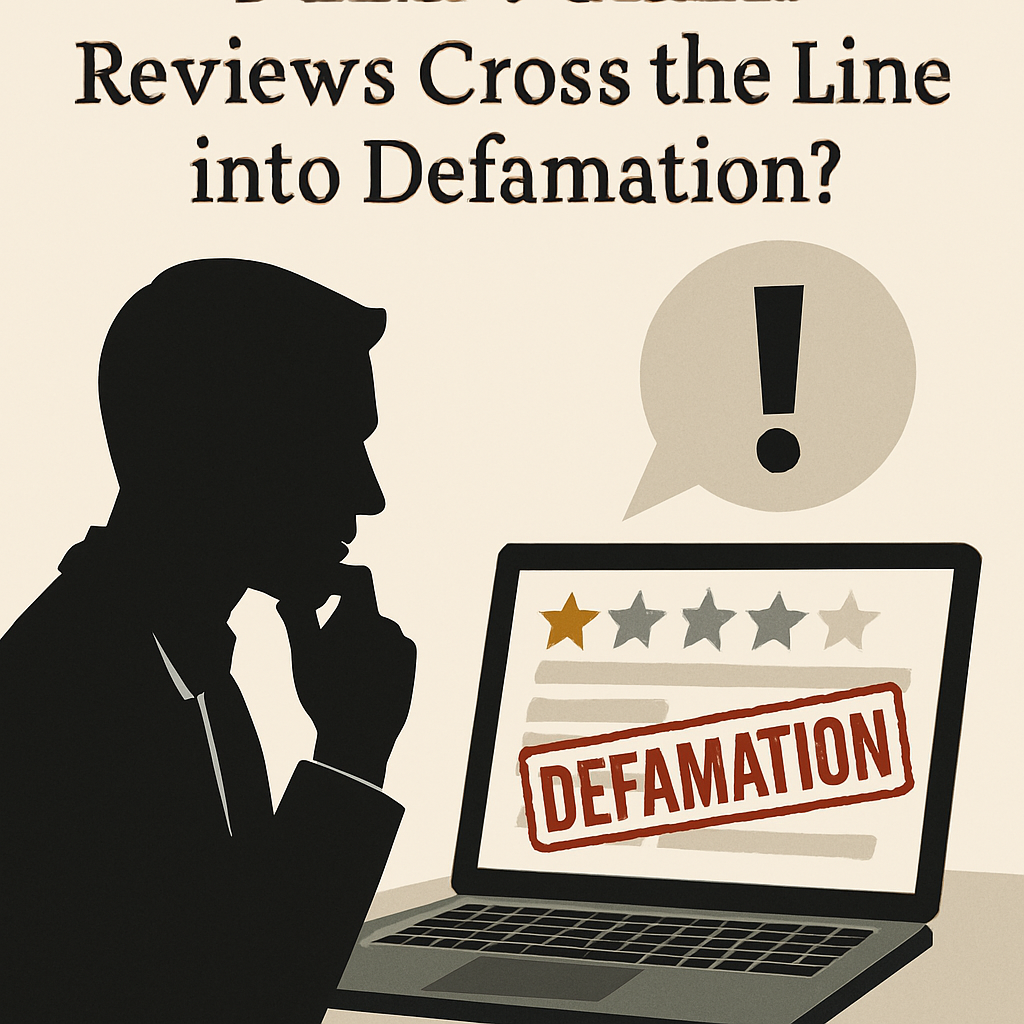Business owners today operate in a world where online reviews can significantly impact their reputation and bottom line. A single negative review can reach thousands of potential customers within hours. But when does a negative review cross the line from protected consumer speech into actionable defamation? What specific statements in a review might expose customers to legal liability?
These questions matter for businesses that rely on their professional reputation and technical expertise. A recent Texas case, Wang v. Guo, No. 03-23-00244-CV (Tex. App.—Austin Mar. 28, 2025), gives us a chance to examine the distinction between protected opinion and potentially defamatory factual claims in online reviews.
Facts & Procedural History
An HVAC business owner operated Breeze Cooling & Heating in Texas. In October 2021, a customer hired the business owner to repair an air conditioning unit at a rental property. After diagnosing the issue, the technician determined that the air conditioner needed a new blower motor and quoted $580 for parts and labor. The business owner ordered a new motor for $249 and installed it on November 9, 2021, providing a one-year warranty on the part.
Almost a year later, in October 2022, the customer posted a one-star review on the company’s Yelp page claiming that the motor had stopped working and that the technician had installed “an old motor fan” on the air conditioner. The reviewer stated that he had to hire another technician to replace the motor again. In updates to his review, the customer claimed the motor was rusted and questioned how it could be new if it only lasted 10 months.
The business owner offered to refund the cost of the part under warranty if the customer would delete what the owner considered to be a false negative review. The customer demanded $500, the amount he claimed to have paid another technician to replace the motor. When they couldn’t reach an agreement, the HVAC company sent a cease-and-desist letter requesting retraction of what he considered false statements. When the reviewer refused, the business owner filed a defamation lawsuit.
The customer filed a motion to dismiss under the Texas Citizens Participation Act (TCPA), which protects free speech rights. The trial court granted this motion and awarded $5,000 in attorneys’ fees and an additional $5,000 in sanctions. The business owner appealed, and the Texas Court of Appeals reversed the trial court’s decision in part.
What Is the Texas Citizens Participation Act?
The Texas Citizens Participation Act (TCPA) establishes a mechanism for early dismissal of lawsuits that target the exercise of First Amendment rights. Enacted in 2011, this statute aims to protect individuals from strategic lawsuits against public participation (often called “SLAPP” suits) that might otherwise discourage free speech.
The TCPA’s purpose, as stated in Texas Civil Practice & Remedies Code § 27.002, is to “encourage and safeguard the constitutional rights of persons to petition, speak freely, associate freely, and otherwise participate in government to the maximum extent permitted by law and, at the same time, protect the rights of a person to file meritorious lawsuits for demonstrable injury.”
This balancing act matters in the context of online business reviews, where the legislature has recognized both the value of consumer feedback and the legitimate interest of businesses in protecting themselves from false statements. For businesses considering filing defamation claims or consumers wondering about their rights when posting reviews, understanding the TCPA is essential.
The statute creates a three-step analysis that courts must follow when evaluating a motion to dismiss under the TCPA. This framework has become increasingly important for businesses dealing with negative online reviews, as it determines whether a defamation claim can proceed past the initial stages.
How Does the TCPA Motion to Dismiss Framework Work?
When a defendant files a TCPA motion to dismiss, the court must follow a specific analytical framework to determine whether the case should proceed. This three-step process helps us understand how defamation claims against online reviewers are evaluated.
First, the movant (typically the defendant who posted the review) must demonstrate that the TCPA applies to the legal action against them. This means showing that the lawsuit is based on or is in response to the exercise of protected rights, such as free speech on matters of public concern. Consumer reviews of businesses are generally considered matters of public concern under the TCPA.
Second, if the movant meets that initial burden, the burden shifts to the nonmovant (typically the business owner claiming defamation) to establish “by clear and specific evidence a prima facie case for each essential element” of their claim. This heightened evidentiary standard requires more than mere notice pleading—it demands evidence that is both “clear” (free from doubt) and “specific” (relating to particular named things).
Third, if the nonmovant satisfies that requirement, the burden shifts back to the movant to establish “an affirmative defense or other grounds on which the moving party is entitled to judgment as a matter of law.”
This framework creates a significant hurdle for businesses seeking to pursue defamation claims based on online reviews. It’s designed to weed out meritless claims early in litigation while allowing legitimate defamation claims to proceed.
What Constitutes Defamation Per Se in Business Contexts?
Defamation generally involves false statements that harm someone’s reputation. When those statements are so obviously harmful that damages can be presumed without specific proof of financial loss, they constitute defamation per se. This distinction matters for businesses dealing with negative online reviews.
In Texas, statements that injure a person in their profession or occupation are considered defamation per se. This includes false statements that directly impugn a business owner’s fitness or abilities in their field. For instance, accusations of fraud, incompetence, or dishonesty in business practices typically qualify as defamation per se.
The court explained that the customer’s statements accusing the business owner of “fraudulently installing a used motor in the air-conditioning unit and charging for a new motor” constituted defamation per se because they were “statements accusing the technician of fraud” and statements “that injure a person in his office, profession, or occupation.”
This classification helps businesses because it eliminates the need to prove actual damages to survive a TCPA motion to dismiss. As the court noted, when statements are defamatory per se, they are “so obviously harmful that general damages may be presumed.”
What’s the Difference Between Opinion and Actionable False Statements?
A key distinction in defamation law—especially regarding online reviews—is the difference between protected opinions and actionable false statements of fact. This distinction often determines whether a negative review can lead to legal liability.
Opinions, even harsh or negative ones, are generally protected by the First Amendment. A customer who writes, “I felt the service was terrible” or “I thought the price was too high” is expressing a subjective opinion that cannot be proven true or false.
In contrast, false statements of fact are potentially actionable as defamation. These are specific, verifiable claims that can be proven true or false. The court emphasized this distinction, noting that the reviewer’s statements that the technician “put an old motor” in the air-conditioning unit and charged for a new one were “actionable statements of fact, not opinion—they are susceptible of being proved true or false.”
For businesses and consumers alike, understanding this distinction matters. A review claiming “I didn’t like their service” carries far less legal risk than one stating “They charged me for new parts but installed used ones.”
How Can Businesses Establish Falsity in Defamation Claims?
For companies claiming defamation based on online reviews, proving the falsity of the statements is a key element. The case provides insights into how businesses can establish this element with sufficient evidence to survive a TCPA motion to dismiss.
The HVAC company submitted an invoice showing the owner had ordered a new motor with the same serial number as the one in the customer’s air conditioner. The court found this to be circumstantial evidence from which it could infer that the technician had installed the new motor he ordered. This evidence was deemed sufficient to establish a prima facie case on the element of falsity.
The court noted that the reviewer offered no evidence to rebut the invoice; he merely offered his theory that because the motor broke after eleven months and had rust on it, it must have been old or used. The court found this insufficient to conclusively rebut the business owner’s evidence.
This aspect of the case highlights the importance of business documentation for both operational needs and potential legal defense. Maintaining detailed records of purchases, installation dates, and warranties can provide crucial evidence if a business faces false claims in online reviews.
What Evidence Shows Negligence or Actual Malice in Online Review Cases?
Another essential element of a defamation claim is establishing that the defendant made the false statement with the required degree of fault—either negligence or actual malice, depending on the context. The case illustrates how businesses can use circumstantial evidence to establish this element.
For private figures like most business owners, the standard is negligence—showing that the reviewer failed to exercise ordinary care in ensuring the statements were true before posting them in a public forum. The technician argued that even if the customer’s initial posting was a good-faith mistake, it still constituted negligence.
The business owner also alleged actual malice (knowledge of falsity or reckless disregard for the truth), pointing to the customer’s demands for money to take down the statements and his refusal to remove them after being presented with the invoice for the new motor. The court found this circumstantial evidence sufficient to establish a prima facie case that the reviewer acted at least negligently.
This aspect of the case underscores the importance of pre-litigation communication. The company’s cease-and-desist letter, which included evidence contradicting the customer’s claims, strengthened the case by potentially establishing that the reviewer continued to maintain statements even after having reason to doubt their truth.
When Do TCPA Protections Not Apply to Online Reviewers?
While the TCPA provides important protections for free speech, including online reviews, these protections are not absolute. The case illustrates an important limitation: the TCPA does not shield reviewers who make demonstrably false statements of fact that damage a business’s reputation.
When a reviewer goes beyond expressing opinions or general dissatisfaction and makes specific factual claims that can be proven false, those statements may fall outside the TCPA’s protection. In this case, the customer’s specific claim that the technician installed a used motor while charging for a new one was a factual assertion that could be—and according to the court, was—contradicted by evidence.
For consumers writing online reviews, this distinction matters. Sticking to subjective assessments of their experience (“I was disappointed with the service”) presents far less legal risk than making specific factual claims about a business’s practices, particularly claims that suggest fraud or dishonesty.
For businesses dealing with negative reviews, understanding this limitation on TCPA protection can help determine when legal action might be appropriate versus when the review is likely protected speech.
The Takeaway
The Wang v. Guo case highlights the line between protected consumer speech and potentially actionable defamation in online business reviews. While consumers have broad freedom to express opinions and share their experiences, making specific factual claims that can be proven false—particularly claims that accuse a business of fraud or dishonesty—can create legal liability. For businesses, maintaining thorough documentation of transactions, parts ordered, and warranties provided can serve as crucial evidence if faced with false claims in reviews. For consumers, focusing reviews on subjective experiences rather than making specific factual assertions about business practices significantly reduces legal risk. This case demonstrates that courts will protect legitimate consumer speech while still providing businesses a remedy when reviews cross the line into demonstrably false statements that damage professional reputation.


